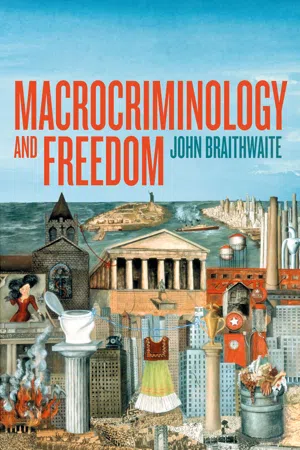
- 814 pages
- English
- PDF
- Available on iOS & Android
Macrocriminology and Freedom
About this book
How can power over others be transformed to 'power with'?
It is possible to transform many institutions to build societies with less predation and more freedom. These stretch from families and institutions of gender to the United Nations. Some societies, times and places have crime rates a hundred times higher than others. Some police forces kill at a hundred times the rate of others. Some criminal corporations kill thousands more than others. Micro variables fail to explain these patterns. Prevention principles for that challenge are macrocriminological.
Freedom is conceived in a republican way as non-domination. Tempering domination prevents crime; crime prevention reduces domination. Many believe a high crime rate is a price of freedom. Not Braithwaite. His principles of crime control are to build freedom, temper power, lift people from poverty and reduce all forms of domination. Freedom requires a more just normative order. It requires cascading of peace by social movements for non-violence and non-domination. Periods of war, domination and anomie cascade with long lags to elevated crime, violence, inter-generational self-violence and ecocide. Cybercrime today poses risks of anomic nuclear wars.
Braithwaite's proposals refine some of criminology's central theories and sharpen their relevance to all varieties of freedom. They can be reduced to one sentence. Strengthen freedom to prevent crime, prevent crime to strengthen freedom.
Frequently asked questions
- Essential is ideal for learners and professionals who enjoy exploring a wide range of subjects. Access the Essential Library with 800,000+ trusted titles and best-sellers across business, personal growth, and the humanities. Includes unlimited reading time and Standard Read Aloud voice.
- Complete: Perfect for advanced learners and researchers needing full, unrestricted access. Unlock 1.4M+ books across hundreds of subjects, including academic and specialized titles. The Complete Plan also includes advanced features like Premium Read Aloud and Research Assistant.
Please note we cannot support devices running on iOS 13 and Android 7 or earlier. Learn more about using the app.
Information
Table of contents
- Abbreviations
- List of illustrations
- Preface
- 1. From trickles to rivers of crime and freedom
- 2. Reframing criminology
- 3. Macro-patterns of normative order
- 4. Opportunities for freedom and for domination
- 5. Tempering the inequality that empowers crimes of the powerful
- 6. Closing illegitimate opportunities by separating powers
- 7. Tempered and diverse forms of capital
- 8. Tempering power through networked governance
- 9. Minimally sufficient punishment
- 10. Why incapacitation trumps deterrence
- 11. Tempered cascades of crime
- 12. The art of struggle for free societies
- Appendix I: Tributary propositions; rivers of meaning
- Bibliography